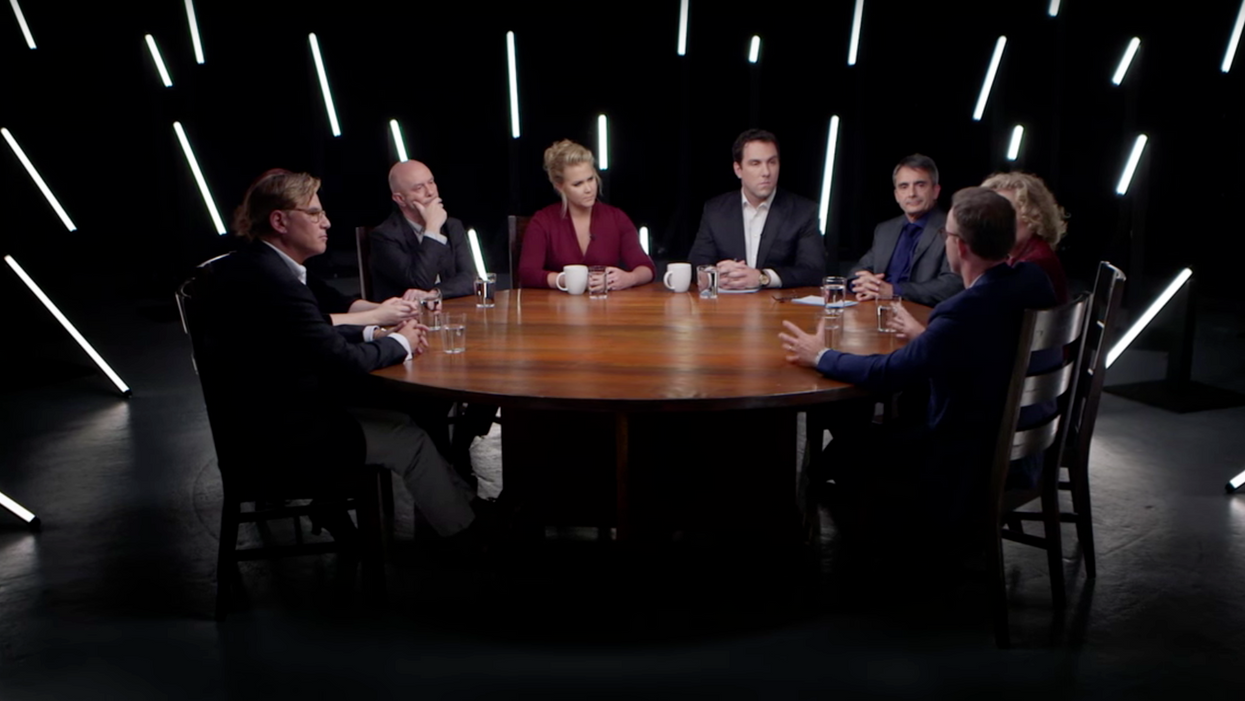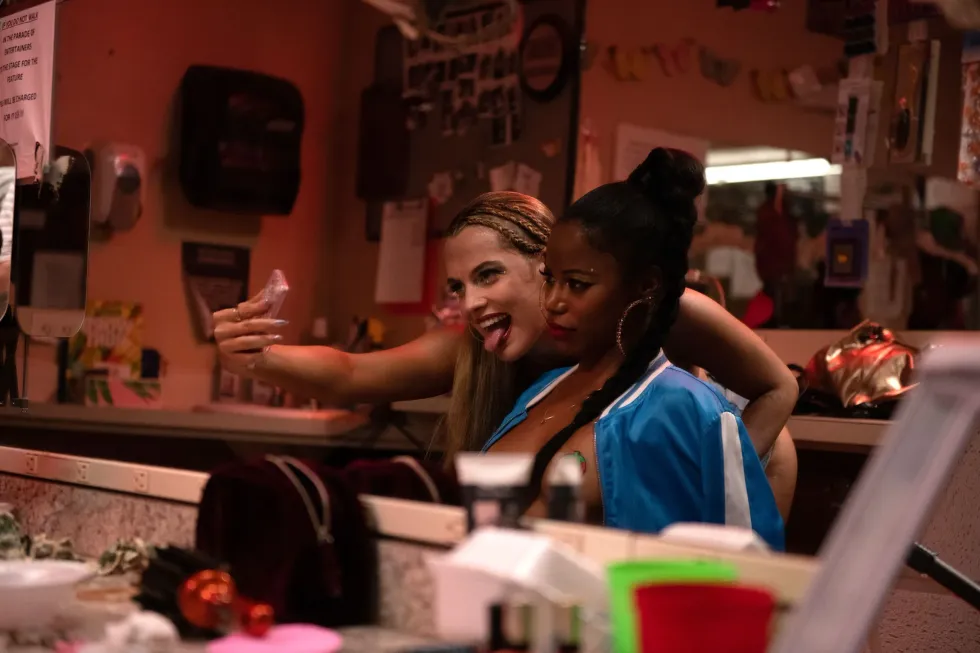Watch Amy Schumer, Aaron Sorkin & More Sit in a Room & Talk Screenwriting
A bunch of smart people in one room talking about something other than politics or Star Wars. Yes please.

For this year's THR Writer Roundtable, Amy Schumer (Trainwreck), Aaron Sorkin (Steve Jobs), Emma Donoghue (Room), Tom McCarthy (Spotlight), Meg LeFauve (Inside Out) and Nick Hornby (Brooklyn) talk about screenwriting — but the conversation doesn't end there. They discuss the nature of new media, journalism in the internet world, the cult of the amateur and their biggest lessons as screenwriters. Also, it's funny watching Aaron Sorkin defend himself against interviewer Stephen Galloway when he's accused of fudging facts on Steve Jobs. (26:16)
Check out the roundtable below, and continue on for some takeaways.
On Dealing with Professional Mistakes
Nick Hornby: I was writing books and I didn't know who I was writing them for. If I had known that then I would've saved myself quite a lot of work. The thing about writing is you feel like you're walking a plank. Everyone behind you has got jobs and mortgages and you're getting older and older. But I've never regretted embarking on the journey.
Meg Lafune: I came out to LA to be a writer and immediately bailed. I became an assistant and you start to shadow artists, which I think is incredibly dangerous. There was a lot of time spent not writing, but I can't say I regret it because I learned so much. You have to go write the 5 bad scripts that nobody will ever see, then get back to the bottom of the process and learn an entirely new thing.
On Criticism
Aaron Sorkin: I don't read too much of it, good or bad, or I will become addicted to it. The internet in general, while I recognize everything good about it, there are things about it that I find troubling. The anonymity of the internet has made us all meaner and dumber. This thing that was supposed to bring us together is doing the opposite. The internet takes away credentials. Andrew Keen was one of the founding fathers of the way social media is set up on the internet. If you're an up and coming journalist and you can't get a job at the Hollywood Reporter, what you do now is start your own blog and attack mostly the Hollywood Reporter.
On Screenplay Format
Nick Hornby:In a novel if you're writing a scene that works there's no reason to stop writing them. If it's 15 pages an editor will leave it and say 'that's great.' But in a screenplay a 15-page scene is a big moment. It's having to lose stuff that you like or are proud of or pleased with simply because of the demands of the form. But I really like the collaborative aspect. Networking and finding people is the thing that I've enjoyed most as time has gone on. Meeting the right people. I didn't know them when I started writing, and you're given more and more opportunity to meet and work with kindred spirits.
On Routine
Aaron Sorkin:It looks a lot like lying on a couch and watching ESPN to the untrained eye. I'm not a speedster as a writer. It takes me a while to even start writing something.
On Considering Audience Reaction
Tom McCarthy:I don't think we really considered it. Our avenue into the movie was through the journalists and through their experiences. We were seeing what they were seeing. You just gotta forget about that stuff. You always have an audience in mind but you're just going after the story.
On Getting the Facts Right
Aaron Sorkin:It shouldn't be journalism. I don't think what you want from art is a Wikipedia page shot nicely. It oughta be subjective and not objective.
Nick Hornby: I wrote the scene where the lead character comes to Ellis Island. I did my own version of that, then just before filming, one of the production team phoned up and said 'You know, people stopped coming to New York through Ellis Island in about 1934.' I said 'No, I did not know that.' I called Colm [Toibin] and he say 'Oh, that's interesting.'
Their Biggest Teachers
Meg LeFauve: Certainly being in a Braintrust at Pixar teaches you a tremendous amount very fast. I've always approached writing as: "What are we trying to say?" Always look for the note under the note.
Emma Donoghue:Just going through writing the script through the process of seeing it get made. I was all about the dialogue, and then I realized that you can take away all the dialogue and it's still the scene. And I wouldn't have known that starting out.
In fiction you can do anything, there's no rules at all.
On Writing What You Know
Amy Schumer:I think people should do what they're good at. Some people are good at writing fiction, I like to write what I know. But I like to daydream a lot. I'm an introvert. As a comic hopefully you're evolving. But there's something really appealing about people letting themselves be vulnerable. Every comedian starting out is just doing an impression of a comedian. Hopefully you get closer and closer to yourself.
Nick Hornby: The process of getting older is pushing further out. They say 'write what you know,' well — I don't know that much.
Aaron Sorkin:I didn't know anything about Steve Jobs and more importantly I didn't care that much. It can become what you know. Your take on a particular story is going to be framed by your subjective view. So if you lined up 10 writers and everybody write a movie about Steve Jobs, you'd get 10 different movies. We're well on our way to proving that.
On Regrets
Aaron Sorkin: There's nothing I've ever written, not a single episode of television, not a play, not a movie that I don't badly wish I could have back and do again.
Tom McCarthy:I don't feel that way. It's a process. Hopefully we don't regret that much. Better than regretting is accepting and work through it. It's a lot less painful.
Nick Hornby:The impulse to write is to take what went wrong before and use it for the next thing. The idea of going back on anything right now is a nightmare for me.
On Self-Doubt
Nick Hornby: There's way more opportunity for self-doubt in movies than in books. Because you get turned down endlessly by endless numbers of people. Whereas with my books I'm dealing with my editor and unless I've completely screwed up the book he will publish it. With movies every week a financier isn't interested, an actor isn't interested, a director isn't interested.
On Advice to Beginners
Tom McCarthy: As a young writer, finding like-minded people that I could connect with and make myself better by. My father always told me you have to network in this business. And I thought I would never network, and I kind of shut myself off from a lot.
Nick Hornby: When I started I didn't know that everyone pretends that a movie is going to be made at the end of this process. I thought it was that when things weren't going anywhere it was because the script was terrible and you should just pack it in. But in fact, that's all part of it. There's this pretense, the writer pretends, producers are pretending, directors are pretending, and eventually if you pretend hard enough then it goes from black and white to color and a movie is made at the end of it.
Source: The Hollywood Reporter

















